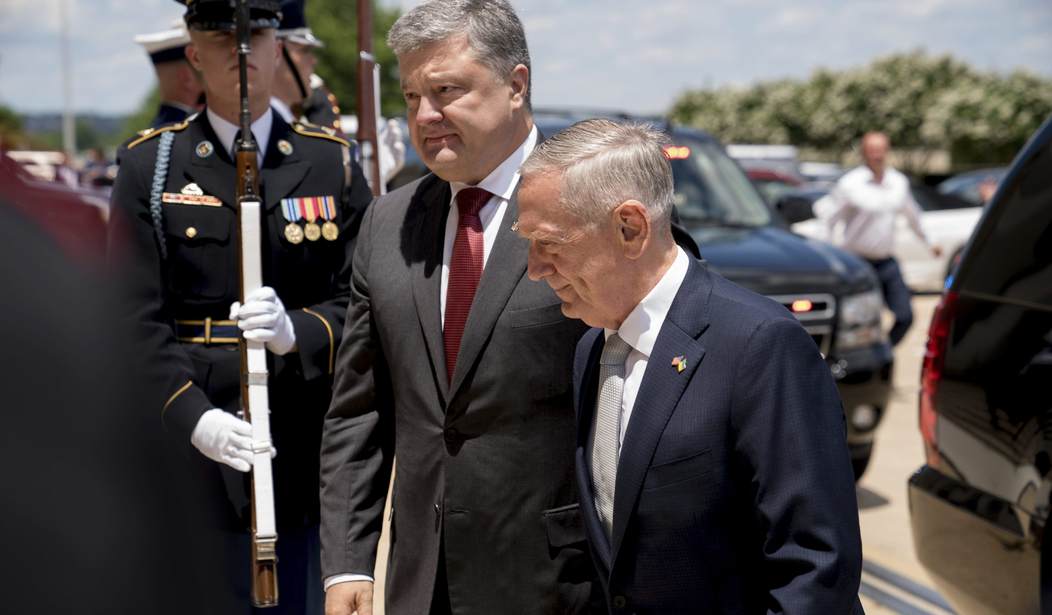WASHINGTON – On the same day that Ukrainian President Petro Poroshenko met with Vice President Mike Pence and President Trump, the Treasury Department expanded its list of individuals and organizations subject to financial sanctions.
“These designations will maintain pressure on Russia to work toward a diplomatic solution,” Treasury Secretary Steven T. Mnuchin said Tuesday. “This administration is committed to a diplomatic process that guarantees Ukrainian sovereignty, and there should be no sanctions relief until Russia meets its obligations under the Minsk agreements.”
The list included dozens of organizations, individuals and state officials that fit under the existing economic sanctions policy tied to business dealings in separatist territories in Ukraine. The list includes two Russian officials, two people with ties to a Russian official, two groups owned or controlled by an individual on the previous list, and 11 individuals and groups operating in Crimea.
National Economic Council Director Gary Cohn in May said that Trump was exploring changes to existing financial sanctions against Russia. The Washington Post reported that the White House was considering restoring Russian access to properties in New York and Maryland, which the Russian government allegedly used as intelligence compounds. The Obama administration barred Russian access to the properties in December 2016, following the intelligence community assessment that Russia had conducted an extensive hacking and influence operation targeting the 2016 U.S. presidential election.
Tuesday’s decision is seen not only as a gesture to Ukraine as it works toward a peaceful resolution to the ongoing conflict, but comes as Congress fears that the White House may consider rolling back sanctions in favor of Moscow.
The Senate last week overwhelmingly approved legislation that would maintain and potentially increase financial sanctions against Russia, while barring the White House from altering the sanctions without congressional approval. The Countering Iran’s Destabilizing Activities Act was passed in a veto-proof 98-2 vote.
Trump on Tuesday told reporters that “a lot of progress has been made” for U.S.-Ukraine relations. The White House released readouts summarizing Poroshenko’s discussions with Trump and Pence; the vice president “stressed the importance of continued reforms to fight corruption, improve the business climate, and keep Ukraine’s International Monetary Fund program on track,” the White House said.
Trump and Poroshenko discussed “support for the peaceful resolution to the conflict in eastern Ukraine and President Poroshenko’s reform agenda and anticorruption efforts,” the White House said.
Tuesday’s Treasury decision signals that the White House wants to keep sanctions policy an executive matter rather than a legislative matter, which has been the position of both the Trump and Obama administrations, an expert told PJM.
“Presidents prefer to have control over sanctions policy through executive action because it enables it to be more flexible, and therefore to be an instrument that they can deploy,” Matthew Rojansky, director of the Kennan Institute and Russia expert at the Woodrow Wilson Center, said in an interview Tuesday. “They can ratchet it up. They can ratchet it down as part of their diplomacy.”
House Republicans, who have stalled the Senate sanctions bill, could attempt to align with the White House’s posture on sanctions policy. The new sanctions list makes that task easier, as lawmakers can say that the administration has not softened on Russian sanctions.
Rep. Maxine Waters (D-Calif.) on Monday introduced two pieces of legislation aimed at stopping the White House from changing sanctions against Russia. She introduced the Freezing Russian Sanctions Act and the Deny Russian Access to Diplomatic Compounds Act, with the latter addressing the New York and Maryland compounds.
“Despite all that we continue to discover about the full scope of Russian efforts to undermine our democracy, the Trump administration and those connected to it – many of whom have ties to Russia or pro-Russia forces in Ukraine – have been inexplicably focused on lifting sanctions and other punishments rightly imposed on Russia for their belligerent conduct toward the United States and other countries around the world,” Waters said Monday. “My legislation would forestall any efforts by this administration to do so.”









Join the conversation as a VIP Member